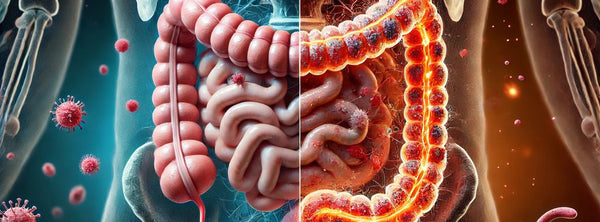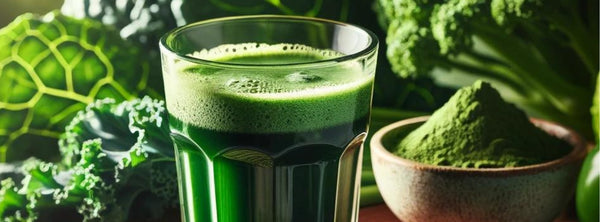
What Is Reflux?
Reflux or Heartburn is similar to Gastro-Oesophageal Reflux Disorder (GORD) because they allow stomach acid to flow back up through the oesophageal sphincter into the oesophagus, causing pain and discomfort by irritating and damaging the cells that line the oesophagus. The difference between Reflux and GORD is that Reflux and Heartburn generally occur once a week or less, whereas GORD occurs twice a week or more. To keep it simple, throughout this blog, we will refer to Reflux, Heartburn and GORD as Reflux as many of the symptoms overlap. Untreated, Reflux will damage the cells of the oesophagus causing them to become precancerous, a condition known as Barrett's Syndrome.
The Symptoms of Reflux
Reflux symptoms can vary from person to person, but generally, a sufferer can have one or more of the following;
- Heartburn - an uncomfortable burning sensation in the chest just below the breastbone, but can rise into the back of the throat. For many sufferers, this awkward feeling worsens after eating, bending over or lying down.
- Acid Reflux - occurs when the stomach acid forces its way past the oesophageal sphincter valve and into the oesophagus, causing burning pain and a sour taste in the back of the throat.
- Burping and Stomach Bloating - occur because the pH of the stomach is generally not strong enough, leading to food fermenting and creating gas.
- Bad Breath - Fermenting foods due to low stomach acids cause the foods to go rancid, resulting in bad breath.
- Hoarse or Sore Throat - caused by the stomach acid irritating or damaging the throat and voice box (larynx)
- Persistent Cough - can be caused by irritation from stomach acid on the oesophagus lining.
- Tooth Decay and Gingivitis - an occur when acid enters the mouth primarily at night and erodes tooth enamel, and damage the gums leading to decay and inflammation of the gums.
- Pain When Swallowing - due to the oesophagus being damaged and inflamed.
- Breathing Difficulties or Asthma - there is debate around the actual trigger, but for some, acid can enter or damage the airways contributing to breathing difficulties.
Causes Of Reflux
When we swallow food or liquid, a band of muscles at the bottom of the oesophagus called the oesophageal sphincter valve relaxes and opens, which allows the food and drink to pass into the stomach. If the sphincter valve does not close properly, then acid can backwash through this valve, burning the lining of the oesophagus and causing it to become inflamed and painful. This can further impede the ability of the sphincter to close correctly, thus compounding Reflux.
Conditions That Increase The Risk Of Reflux
- Obesity - excess fat around the stomach can place pressure on the stomach and force its contents back through the sphincter valve and into the oesophagus.
- Hiatus Hernia - is a condition where part of the stomach pushes back up through the opening in the diaphragm where the oesophagus normally sits. Large Hiatus Hernias allow undigested food and stomach acid to pass back into the oesophagus.
- Pregnancy - the growing child can place excess pressure on the stomach causing acid to flow upwards into the oesophagus.
- Stress and Anxiety - can make Reflux seem worse by making the oesophagus more sensitive to acid and pain. In addition, stress and anxiety can impact the ability of the oesophageal sphincter to close properly.
- Hormones - in particular progesterone, an essential hormone needed to help relax smooth muscles. Excess progesterone at specific periods in a woman's reproductive years can relax the muscles controlling the oesophageal sphincter valve causing it to open and allow acid to flow into the oesophagus. The time of elevated progesterone is in pregnancy, and the second half of a woman's menstrual cycle, days 14 to 28.
- Smoking - relaxes the oesophageal sphincter valve, thus allowing food and acid to backwash into the oesophagus.
- Alcohol - weakens the sphincter valve and increases the production of stomach acid
- Scleroderma - weakens the muscles of the oesophagus.
- Pharmaceutical Medications - can trigger or worsen Reflux; these drugs include Ibuprofen, Aspirin, Osteoporosis medications, High blood pressure medications, Anti-anxiety drugs, Tricyclic antidepressants and Antibiotics.
Foods That Can Trigger Reflux
Foods can quite often be a trigger for Reflux. The old saying one man's food is another man's poison is noticeably seen in people suffering from Reflux. Below is a list of foods known to aggravate or bring on Reflux. It is not a definitive list, just a list of the more commonly known foods.
- Greasy Fatty Foods - including healthy fats such as avocados, oils and nuts, relax the oesophageal sphincter valve causing it to open, thus allowing stomach acid to leach into the oesophagus, resulting burning pain. In addition, fatty and fried foods take a long time to digest before they leave the stomach. While they hang around in the stomach, they can aggravate reflux symptoms.
- Dairy - some people believe that dairy helps soothe Reflux, but it actually worsens Reflux firstly due to its high-fat content relaxing the oesophageal sphincter valve, and secondly, it increases stomach acid secretions, especially whole cream milk. Look for low-fat alternatives or avoid them altogether.
- Chocolate - always attracts the noooooo, but chocolate contains chemicals called methylxanthines which act on the nervous system and cause the muscles that activate the oesophageal sphincter valve to relax.
- Coffee / Caffeine - is another beverage or food that aggravates Reflux. Caffeine relaxes the oesophageal sphincter valve causing that burning, tingling feeling - not a good way to start the day.
- Carbonated beverages - fizzy drinks mess with Reflux. The bubbles in the drink expand inside the stomach, creating a lot of extra pressure on the oesophageal sphincter valve, causing burping, which can bring up food and acid.
- Alcohol - causes Reflux in two ways; firstly, it relaxes the oesophageal sphincter valve, and secondly, it increases the production of stomach acid. That's a bad combination, especially if you lie down.
- Peppermint - is a double-edged sword for a reflux sufferer. It is exceptional in relaxing the digestive tract, helping to remove gas, abdominal pain and bloating. Unfortunately, it does too good a job of relaxing the oesophageal sphincter valve, thus increasing the chances of acid entering the oesophagus.
- Tomatoes, Citrus, and Pineapples - are very nutritious foods but are also high in citric acid, which can relax the oesophageal sphincter valve.
- Onions - especially raw, can relax the oesophageal sphincter valve.
- Spicy foods - can aggravate an already irritated stomach or oesophagus, worsening symptoms of Reflux.
Listen To Our Latest Podcast on Reflux
How Does The Medical System Treat Reflux
Generally, the first couple of times when suffering from Reflux, a person will get an over-the-counter antacid such as Mylanta or Gaviscon from a chemist or supermarket. There are two other types of reflux medication available generally by prescription; they are H2 blockers, which stop the stomach cells from producing stomach acid. Brands of H2 blockers include Tagament, Pepcid and Zantac. The other type of reflux medication is called Protein Pump Inhibitors which create a prolonged reduction in stomach acid. Brands include Nexium, Somac, Losec and Pariet. All kinds of medication may offer some relief from Reflux, but all have side effects that can compromise long-term health.
Side-Effects of Pharmaceutical Reflux Medication
Even though pharmaceutical reflux medication may offer relief, there are potential long-term and severe side effects from these medications.
- Over-the-counter antacids neutralise stomach acid and reduce the nutrient absorption from food; this can lead to moderate deficiencies in calcium, phosphate and vitamin B1. Antacids also contain aluminium, and a high intake of aluminium is linked to;
- Confusion, poor memory, lack of attention
- Muscle weakness
- Bone pain and breakage
- Seizures
- Speech problems
- Slow growth rate in children
- Alzheimer's disease
- Increase oestrogen gene expression in cultured breast cancer cells (potential increase risk of breast cancer)
- H2 Blockers and Protein Pump Inhibitors (PPIs) stop the stomach cells from making stomach acid; this may relieve the reflux symptoms but contributes to a long-term decline in health. Stomach acid is essential for breaking down food's vitamins, minerals and phytonutrients. Without these nutrients, every single cell in the body can starve and may not function as they are supposed to. Studies have shown PPI, and H2 blocker medications increase the risk of mineral deficiencies, including magnesium, zinc, iron, folate, vitamin D, vitamin C, calcium, vitamin B1 and vitamin B12 [1], [2], [3], [4]. Interestingly to make stomach acid the body needs zinc, vitamins B1 and B6 a deficiency in these nutrients further drives cellular nutrient starvation. In addition, PPI and H2 Blocker medication have been linked to the following health conditions;
- Cancer [5]
- Digestive bloating, flatulence and abdominal pain
- Diarrhoea
- Constipation
- Anxiety
- Depression
- Bone Fractures [6]
- Dysbiosis [7]
- Cardiovascular events [9]
- Immune Suppression as zinc, Vitamin C and D are essential immune-strengthening nutrients.
- Community-acquired pneumonia and Clostridioides difficile infection [7]
- Chronic kidney disease [8]
- Dementia [9], [10]
H2 Blockers are often touted as a safer alternative to PPI medications but are less effective in reducing stomach acid reflux over time. The FDA in America only recommends that PPI medications be taken no longer than 4 to 12 weeks, depending on the drug and condition. [10] Why, then, are people being prescribed these drugs for years on end? In 2020 the H2 Blocker Zantac (ranitidine) and its generic equivalents were withdrawn from the American, European and Australian markets due to finding cancer-causing chemical N-nitroso dimethylamine (NDMA) in the tablets. In addition, the FDA also recalled the H2 Blocker nizatidine due to the detection of NDMA.
How To Help The Body Heal Reflux Naturally
Natural Medicine does not look at Reflux or GORD as a disease, but rather that the stomach and oesophagus are out of balance. The trick is to bring them back into harmony, thus allowing them to function correctly and without pain or discomfort. This is where herbs reign supreme; they are nature's medicine but operate entirely differently from their distant pharmaceutical cousins. Whereas pharmaceutical medications aim to suppress a symptom rather than heal, herbs are complex medicines that assist in relieving the symptoms. At the same time, it energises the body to begin healing. At the Vitality and Wellness Centre, it is all about providing the right environment so that our patient's body learns how to heal itself so a healthier, more fulfilled life can be lived.
We use some great herbs in the clinic to help relieve and heal the body from Reflux.
- Chamomile is one of the essential herbs to soothe and heal Reflux. Most people would have Chamomile in their cupboard at home, so next time you feel a Reflux episode coming on, don't grab an antacid; pour yourself a cup of Chamomile tea instead. This will relieve the burning pain, soothe the inflamed cells, and strengthen the oesophageal sphincter valve.
- Golden Seal is an excellent herb from North America that soothes and regenerates the mucous membranes of the stomach and oesophagus; also, like Chamomile, Golden Seal strengthens the oesophageal sphincter valve. It is considered by herbalists worldwide to be the premier herb to heal any mucous membrane, which is any tube, intestine or cavity in the body.
- Meadowsweet is an old European herb traditionally used for centuries to revitalise the stomach and return it to optimal health. Meadowsweet has antacid properties that help balance stomach acid; if it is too high or too low, it regulates the acid back to normal levels.
- Marshmallow the herb, not the confectionary, is a demulcent herb that coats the lining of the oesophagus and stomach, reduces inflammation and activates damaged cells to heal themselves.
- Slippery Elm is a herb from North America that has a very high mucilage content and is quite slippery, hence the name. The high mucilage content allows Slippery Elm to coat the mucous membranes easily. This action protects damaged tissue and enables the body to regenerate and heal them.
Many people suffering from Reflux also experience stomach pain independent of the reflux burn; this can be highly uncomfortable and cause a great deal of stress to the sufferer. The pain is your body's way of letting you know that the stomach is inflamed. Chronic inflammation is inflammation that has been present for two weeks or more and causes pain and tissue degeneration, which in itself will exacerbate Reflux. Part of any successful treatment of Reflux needs to incorporate anti-inflammatory strategies; at the clinic, we use the healing power of herbs to lower inflammation and give the cells the best chance to regenerate. Great anti-inflammatory herbs include;
- Turmeric is a powerhouse of a herb from Asia that has been used for more than 2500 years and contains over 235 known active compounds. Turmeric is a potent anti-inflammatory and analgesic without the nasty side effects of many pharmaceutical anti-inflammatory medications.
- Ginger is equally as powerful as turmeric in its ant-inflammatory actions, but when combined, their synergistic anti-inflammatory and analgesic properties explode, creating a super combination to relieve pain and inflammation.
- Nettle Leaf not to be forgotten has been used for centuries in Europe to help relieve pain, inflammation and swelling. In addition, it has strong anti-allergy and antioxidant properties, which further help to lower inflammation throughout the body.
- Green Tea is one of the world's most popular drinks and has been consumed in Asia for over 4000 years. It has potent anti-inflammatory and antioxidant properties that help reduce pain, tissue degeneration and inflammation. It is such a powerful herb that there are over 6000 scientific publications in PubMed discussing the health benefits of Green Tea.
- White Willow gets its healing properties from the bark of this majestic tree and is one of the oldest remedies for pain and reducing inflammation, dating back 3500 years. It is mentioned in ancient texts from Egypt and where it was recommended by Hippocrates, the Father of Medicine, to relieve the pain of childbirth.
Mother Nature sure knows how to Nurture and Heal.
What We Do In The Clinic To Help With Reflux
We know that we are all different, and what triggers Reflux in one person may not trigger it in another. The first thing we do is get our patients to identify any foods or beverages that may trigger Reflux and eliminate them from the diet. This goes a long way in reducing Reflux symptoms, down-regulating inflammation and allowing the body to heal itself.
Generally, we prescribe three nutritional supplements for our patients;
- Stomach Support is a blend of herbs to help the body tighten the oesophageal sphincter valve, balance stomach acid secretions, and regenerate the lining of the oesophagus and stomach.
- Intestinal Repair contains herbs and nutrients that assist the body in soothing an inflamed stomach and oesophageal tissue, plus supports the body's innate ability to heal damaged tissue of the intestinal tract.
- Inflammatory Support combines potent ant-inflammatory and analgesic herbs that allow the body to down regulate inflammation and reduce pain. Thus, supporting the body's inborn ability to heal itself unimpeded by the damaging effects of chronic inflammation and pain.
As the body regenerates the stomach and oesophagus and a person's Reflux symptoms improve, there can be a slow reduction in medication. The timeframe needed for the body to heal itself from Reflux can vary from person to person; for mild cases, a month may be all that is required, and for some severe cases, it may take 6 to 9 months to get better.
To help people who may not have the finances or time to visit a healthcare professional, we have made available a FREE Reflux treatment Guide similar to what we use in our clinic to help patients suffering from Reflux, GORD, GERD and Heartburn. Simply fill in your email address below to get access.
The information provided in this health article, '9 Common Causes Of Reflux and How To Treat Naturally,' is intended for educational purposes only. We make no claims to diagnose, treat, prevent, alleviate or cure illnesses or diseases with any information or product stated. We suggest you consult your healthcare professional before undertaking any health treatment with any health issue.
We hope you found this article on the 9 Common Causes Of Reflux and How To Treat Naturally beneficial. To assist us in helping others, please leave a comment or share this post on social media.
Thanks, and have a great day.




